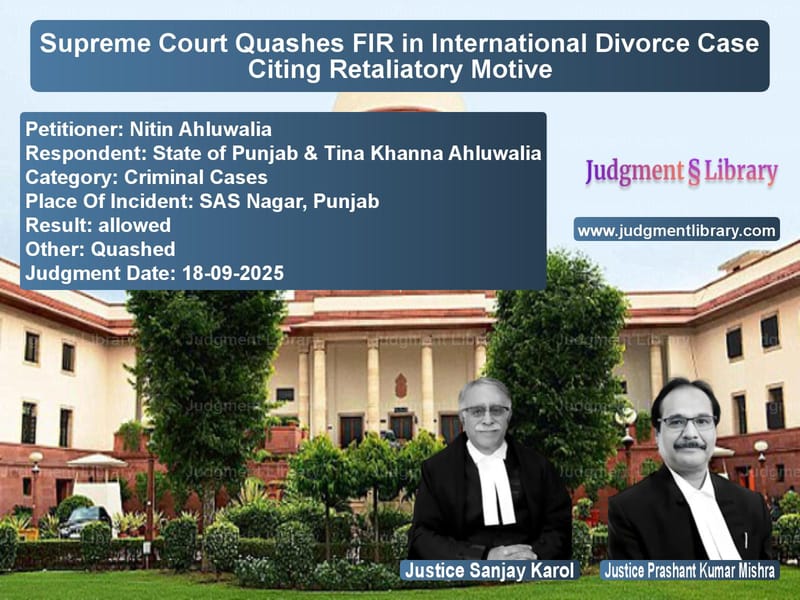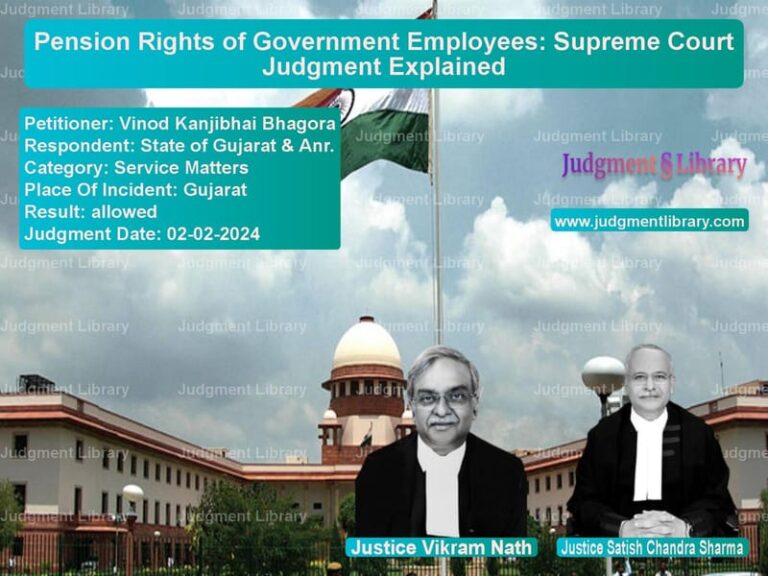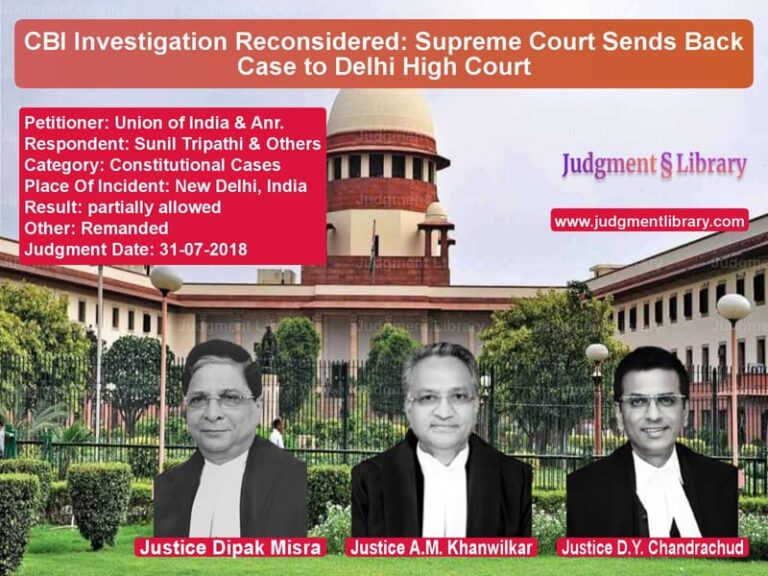Supreme Court Quashes FIR in International Divorce Case Citing Retaliatory Motive
In a significant ruling that highlights the growing concern about misuse of criminal laws in matrimonial disputes, the Supreme Court has quashed an FIR filed under Section 498-A of the Indian Penal Code in an international divorce case involving an Australian citizen of Indian origin and his Austrian wife. The court found that the complaint was filed as a “retaliatory measure” after the husband obtained favorable rulings in foreign courts regarding child custody and divorce.
The case involves Nitin Ahluwalia, an Australian citizen, and Tina Khanna Ahluwalia, an Austrian citizen, who were married in November 2010 according to Hindu rites in Panchkula, Haryana. The couple began their married life in Melbourne, Australia in December 2010 and had a daughter in September 2012. The marriage, however, soon ran into trouble, with the wife leaving the matrimonial home in June 2013 and taking their daughter to Austria without any prior notice to the husband.
The International Legal Battle
The husband initiated proceedings under The Hague Convention on the Civil Aspects of International Child Abduction, 1980 in Austria, seeking the return of his daughter to Australia. The District Court of Vienna Inner City ordered the child’s return to Australia, noting that “neither the consent of the appellant, either immediate or ex-post facto; nor ‘grave risk’ upon return – both factors which allowed the ‘requested state’ to refuse the return of the child, could be established.” The court emphasized that “the enforcement of the legally binding return order, as requested by the father, by means of handover of the minor from the mother to the father, which is factually like a regular changeover after contact, seems like an appropriate method to implement the return of the minor.”
The Austrian courts at multiple levels upheld this decision, with the Supreme Court of Austria rejecting the wife’s appeal. The courts noted that “it cannot be said that the appellant did not have custody of the daughter or in other words custody rights were not exercised by him” and that “apprehensions as to the child’s well-being, being jeopardised, particularly in the shape of psychological stress and possible economic issues, does not meet the standards of truly serious risks.”
The Divorce and Subsequent FIR
While the child custody battle was ongoing, the husband filed for divorce in Australia under the Family Laws Act, 1975 on the ground of irretrievable breakdown of marriage. The Federal Circuit Court of Australia granted the divorce in April 2016. Just one month after the divorce was finalized, in May 2016, the wife lodged a complaint with the police in SAS Nagar, Punjab, alleging demands of dowry and physical and emotional torture. This complaint led to the registration of FIR No. 65 of 2016 on December 7, 2016, under Section 498-A of IPC.
The husband approached the Punjab and Haryana High Court seeking quashing of the FIR, but the High Court rejected his petition, observing that “Detailed and specific allegations have been raised in this First Information Report… The matter is at the very initial stage of investigation… It is clearly too premature a stage for this Court to return a finding in respect to the sustainability of this petition.”
Arguments Before the Supreme Court
Before the Supreme Court, the appellant-husband argued that “the FIR does not disclose any offence; despite orders of the concerned Court, the respondent did not return the child to Australia and instead has brought her to India and filed the FIR to harass him; no allegations of this nature were ever made in the proceedings in both the foreign countries; the FIR has been maliciously filed with an intent of taking advantage of the Indian legal position and to vent out her grudge against the appellant.”
The respondent-wife, on the other hand, contended that “India is not a signatory to the Hague Convention and, therefore, the decree passed by the Courts in Austria need not be considered by the Court.” She also argued that “child custody is a civil matter whereas cruelty, is criminal. They are separate and distinct from each other.”
Court’s Analysis and Reasoning
The Supreme Court, after examining the entire sequence of events, expressed disappointment “in the lack of foresight shown by both parties, particularly when it comes to the well-acknowledged ill effects of continued, strained and hostile relationship between the parents, on a young child.” The court noted that the child, born in September 2012, had been subjected to litigation since she was not even a year old.
The bench made several crucial observations about the timing and circumstances of the FIR. The court stated that “the respondent filed the complaint after the grant of divorce, a month later. Granted that the same is not expressly prohibited by law, it certainly begs the question as to why despite having been separated from the appellant for almost three years to the date, did the respondent consider filing an application with the police at that relevant time.”
The court further observed that “to entertain the possibility that the same is nothing but a counterblast to the fact that the appellant has two orders in his favour, one by the Courts in Austria ordering the respondent to bring the child back to Australia and the other, by the Courts in Australia, accepting the appellant’s prayer for grant of divorce, does not appear far-fetched.”
Read also: https://judgmentlibrary.com/supreme-court-quashes-criminal-proceedings-in-property-dispute-case/
Questionable Conduct and Contradictions
The Supreme Court found several aspects of the wife’s conduct questionable. The court noted that “Despite there being orders of the concerned Courts in Austria, the child, as alleged by the appellant, is yet to be returned to Australia, either with or without her mother accompanying her. This position of the appellant has not been controverted by the respondent.”
The court also pointed out a significant contradiction in the wife’s position: “when service was to be effected for the papers of divorce proceedings initiated by the appellant, the same was made in India. This, to our mind casts doubt on the genuineness of the respondent for the reason that one of the arguments she made in favour of her position of wanting to keep the child in Austria, was that she had been integrated in the society there.”
The bench also found it suspicious that “the period of the alleged cruelty meted out by the appellant, extends to a period beyond the time that they were married. We may only wonder how that can be.”
Legal Precedents and Final Ruling
The Supreme Court relied on its recent judgment in Digambar v. State of Maharashtra, where similar proceedings were quashed after the court found that “it was lodged after the legal notice for Divorce was sent by the complainant therein. It was therefore concluded that the FIR came to be lodged as a retaliatory measure intended to settle score with the husband and his relatives.”
The court also referred to Jayedeepsinh Pravinsinh Chavda v. State of Gujarat, which clarified that “‘cruelty’ simpliciter is not enough to constitute the offence, rather it must be done either with the intention to cause grave injury or to drive her to commit suicide or with intention to coercing her or her relatives to meet unlawful demands.”
Applying these principles, the Supreme Court held that “the instant facts attract parameter 7 of those laid down in State of Haryana v. Bhajan Lal and as such, it can be said that if the FIR proceeds further, it would be an abuse of the process of law.” Consequently, the court quashed the FIR and set aside the impugned judgment of the High Court.
This judgment serves as an important reminder that while the courts must take allegations of cruelty seriously, they also have a duty to prevent the misuse of criminal laws as tools of harassment in matrimonial disputes, particularly in cases involving international elements where parties may seek to exploit jurisdictional differences.
Petitioner Name: Nitin Ahluwalia.Respondent Name: State of Punjab & Tina Khanna Ahluwalia.Judgment By: Justice Sanjay Karol, Justice Prashant Kumar Mishra.Place Of Incident: SAS Nagar, Punjab.Judgment Date: 18-09-2025.Result: allowed.
Don’t miss out on the full details! Download the complete judgment in PDF format below and gain valuable insights instantly!
Download Judgment: nitin-ahluwalia-vs-state-of-punjab-&-ti-supreme-court-of-india-judgment-dated-18-09-2025.pdf
Directly Download Judgment: Directly download this Judgment
See all petitions in Dowry Cases
See all petitions in Domestic Violence
See all petitions in Alimony and Maintenance
See all petitions in Child Custody
See all petitions in Judgment by Sanjay Karol
See all petitions in Judgment by Prashant Kumar Mishra
See all petitions in allowed
See all petitions in Quashed
See all petitions in supreme court of India judgments September 2025
See all petitions in 2025 judgments
See all posts in Criminal Cases Category
See all allowed petitions in Criminal Cases Category
See all Dismissed petitions in Criminal Cases Category
See all partially allowed petitions in Criminal Cases Category







